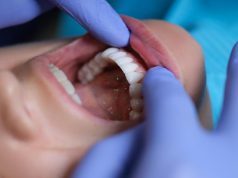Results encouraging, with clear margins in 33 of 35 patients; 13 patients spared from adjuvant tx
TUESDAY, Oct. 27, 2015 (HealthDay News) — For patients with oropharyngeal squamous cell carcinoma (SCC), transoral robotic surgery is feasible, according to a study published in the November issue of Head & Neck.
Balazs B. Lörincz, M.D., from the University Medical Centre Hamburg-Eppendorf in Germany, and colleagues conducted a single-institution prospective study to examine the feasibility, completeness of resection, and functional outcomes for oropharyngeal SCC treated with transoral robotic surgery. Participants included 35 patients with T1 and T2 oropharyngeal SCC who underwent transoral robotic surgery between September 2011 and April 2013. Patients were followed for a median of 13 months.
For the preliminary oncology outcome, the researchers assessed completeness of resection, disease-free survival, and cancer recurrence. The results were encouraging, with clear resection margins achieved in 33 patients. In 37.1 percent of cases (13 patients), adjuvant treatment was completely spared. At the last follow-up (median, 13 months), 30 patients (85.7 percent) were recurrence-free, and 34 patients were alive. In functional outcomes, the median duration of nasogastric tube feeding was five days and none of the patients had a nasogastric tube at the last follow-up. Patients spent a median of one day in the intensive care unit and a median of one day intubated. Patients had to be taken back to the operating theater because of postoperative bleeding from the resection site on two occasions.
“Based upon our early oncologic and functional outcomes, we are convinced that further clinical investigations are justified and continued efforts to decrease the overall treatment-related morbidity of the multimodality therapy of head and neck SCC are encouraged,” the authors write.
Copyright © 2015 HealthDay. All rights reserved.








